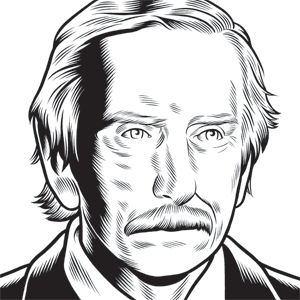
THE BELIEVER: Let’s talk about two people sitting on a park bench in The Zoo Story. One of them ends up impaling himself on a knife. That’s kind of shocking.
EDWARD ALBEE: It is?
BLVR: Were you not shocked by it?
EA: Shocking in what context?
BLVR: Surprising.
EA: To whom?
BLVR: To the audience.
EA: Oh. Oh, yeah. Sure.
BLVR: I’m also wondering, why didn’t Peter leave?
EA: There would have been no fucking play.
BLVR: How do you keep two people talking?
EA: I don’t. They keep themselves talking.
BLVR: Do you feel like these characters are entities—
EA: They are three-dimensional, live people. They’re not characters.
BLVR: You don’t see them as any kind of aspect of yourself?
EA: No. I do not.
BLVR: Do you think that’s unrealistic?
EA: I think that’s foolishness on the part of the playwright to write about himself. People don’t know anything about themselves. They shouldn’t write about themselves.
BLVR: That strikes me as interesting, because your biography was written in such a way that it seemed to be saying—
EA: I didn’t write it.
BLVR: I know, but Mel Gussow said that your plays were your journals, in a way. Would you agree with that?
EA: Did I ever say that?
BLVR: You didn’t say that. Mel did.
EA: Well, ask him.
BLVR: He’s not around anymore.
EA: I know. I can’t answer for him. He said lots of things in that book that I don’t totally find valid.
BLVR: Really?
EA: ’Course. He tried too much connective tissue. All people who write about playwrights do that. I mean, I do not invent characters. There they are. That’s who they are. That’s their nature. They talk and they behave the way they want to behave. I don’t have a character behaving one way, then a point comes in the play where the person has to either stay or leave. If I had it plotted that the person leaves, then the person leaves. If that’s what the person wants to do. I let the person do what the person wants or has to do at the time of the event.
BLVR: Would you say you write character-driven plots?
EA: What else could they be driven by?
BLVR: Some playwrights seem to want the plot to supersede whatever the characters’ motivations are.
EA: Define plot.
BLVR: What happens in a play.
EA: “What happens in a play?” That’s the plot. OK. What does that have to do with the behavior of the characters?
BLVR: I guess that’s my question to you. Do you find that you have a plot in mind or that the characters’ motivations are driving the plot?
EA:...
You have reached your article limit
Sign up for a digital subscription and continue reading all new issues, plus our entire archives, for just $1.50/month.
Already a subscriber? Sign in




